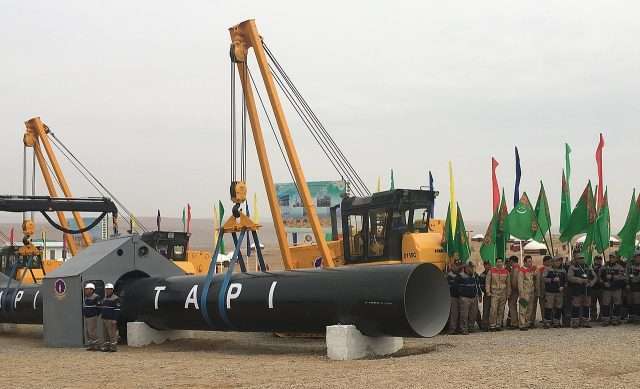Navigating Domestic Challenges and Needs: Turkmenistan-Pakistan Partnership in Advancing TAPI

Geopolitical Report ISSN 2785-2598 Volume 34 Issue 5
Author: Guido Keller
Turkmenistan and Pakistan seek to confirm and expand their cooperation, notably in the domain of energy cooperation, with a focal emphasis on the Turkmenistan-Afghanistan-Pakistan-India (TAPI) natural gas pipeline project.
Anchored by the imperative to diversify Turkmenistan’s natural gas exports and address heightened Russian involvement in the Central Asian energy sector, this partnership assumes substantial strategic significance.
Against the backdrop of a complex domestic landscape in Pakistan, characterised by governance challenges, socioeconomic disparities, and security concerns, the TAPI initiative emerges as a potential catalyst for economic revitalisation.
The ensuing analysis underscores the multifaceted benefits of the TAPI project for both nations, while also shedding light on its broader geopolitical relevance for the region. Additionally, it assesses the potential impact on neighbouring Afghanistan and India.
Background Information
On September 13th, 2023, Ambassador of Turkmenistan to Pakistan Atajan Movlamov met with Pakistani Acting Prime Minister Anwaar ul-Haq Kakar to discuss the necessity of developing a partnership in the energy sector.
The parties noted the importance of taking measures to speed up implementing energy projects. Atajan Movlamov and Anwaar ul Haq Kakar also discussed aspects of cooperation in the fields of trade and economics.
Let us recall that, in April 2023, Deputy Minister of Foreign Affairs of Turkmenistan Vepa Khadzhiev negotiated with Pakistani Foreign Minister Hina Rabbani Khar and agreed to accelerate the construction of the TAPI gas pipeline. During the same month, Turkmenistan accomplished the mission to export its natural gas to Pakistan through Afghanistan.
In June 2023, the republics signed a joint plan for implementing the TAPI project. The document provides for the completion of a feasibility study of construction work as soon as possible.
Geopolitical Scenario of TAPI Pipeline
Turkmenistan and Pakistan have recently reaffirmed their shared commitment to fortifying economic cooperation, with a pronounced emphasis on the energy sector. This strategic collaboration is driven by Ashgabat’s imperative to diversify its natural gas exports, prompted by heightened Russian involvement in the Central Asian energy landscape.
Indeed, in March 2023, Russia signed with Uzbekistan and Kazakhstan a ‘trilateral gas union’ that might represent geopolitical leverage in favour of Moscow and Beijing by simultaneously satisfying the Chinese energy market’s needs and supporting the Russian and Chinese foreign policy in Central Asia.
Given this framework, Turkmenistan is ready to accelerate constructing the TAPI natural gas pipeline, a crucial initiative that is expected to produce significant economic and geopolitical benefits. Back in 2010, Ashgabat hosted a summit of the heads of states participating in the project, who signed a framework agreement on the gas pipeline and an intergovernmental agreement on implementing TAPI.
The gas pipeline should run from the Turkmen Galkynyş field in the Mary province, 150 km from the border of Afghanistan, through the Afghan provinces of Herat, Farah, Helmand and Kandahar and further to Pakistan and India. The project estimated annual volumes of deliveries through the TAPI pipeline at the level of up to 33 billion cubic meters of gas.
Pakistan, currently navigating a period of complexity, confronts a confluence of domestic challenges, spanning governance issues, socioeconomic disparities, and security concerns. The prime minister, who ascended to power after Imran Khan, faces an array of pressing internal dilemmas. These encompass the resurgence of Tehrik-e-Taliban Pakistan (TTP), whose renewed waves of violent attacks pose significant security challenges.
The expected TAPI pipeline initiative stands poised to deliver a salutary impact on Pakistan’s economic landscape and energy sector. It holds the potential to ease Beijing’s reservations regarding Islamabad’s ability to effectively implement and sustain the ambitious China-Pakistan Economic Corridor (CPEC).
Furthermore, the TAPI pipeline carries profound geostrategic implications for Afghanistan and India, both contiguous nations sharing borders with Pakistan.
By the way, despite the Taliban’s overtures towards securing the local milieu and promoting infrastructural projects since their ascent to power in August 2021, the foremost challenge continues to be the pervasive security concerns that prevail in Afghanistan.
For India, acutely aware of the necessity to diversify its energy sourcing, the prospect of Turkmen natural gas assumes paramount significance. This resource, when harnessed effectively, holds the potential to not only galvanise India’s economic expansion but also to serve as a pivotal source to meet the country’s burgeoning internal energy demands, thus affording India a measure of strategic autonomy in its energy policy.
Conclusion
Turkmenistan holds a prominent position among global natural gas producers. Pakistan constitutes a growing economy marked by a surging demand for energy resources.
Exporting gas to Pakistan gives Turkmenistan a prospect to expand its customer network and enhance its income from gas exports. Furthermore, it can provide Pakistan with a reliable energy source, thus addressing its increasing energy needs.
Presently, Pakistan leans heavily on imported oil to fulfil its energy demands. The diversification of its energy portfolio, to include natural gas, has the potential to reduce its reliance on imported oil, consequently bolstering its energy security. The TAPI project, if realised, promises to engender employment prospects and catalyse infrastructure development within the participating nations, imparting a spectrum of economic advantages.
Do you like SpecialEurasia reports and analyses? Has our groundbreaking research empowered you or your team? Now is your chance to be a part of our mission! Join us in advancing independent reporting and unlocking the secrets of Eurasia’s complex geopolitical landscape. Whether through a one-time contribution or a monthly/yearly donation, your support will fuel our relentless pursuit of knowledge and understanding. Together, let’s pave the way for a brighter future. DONATE NOW and secure your place in shaping the geopolitical narrative.
